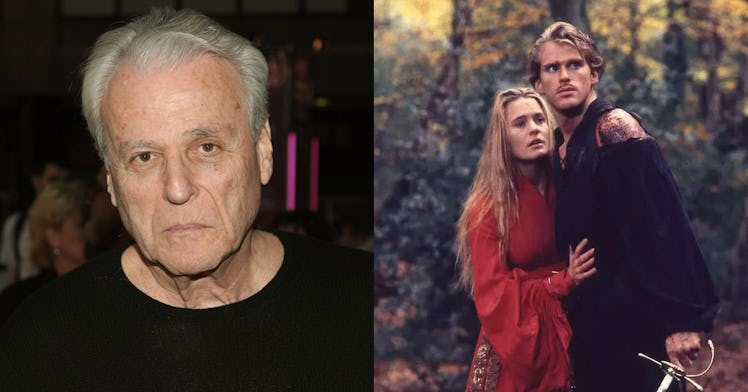William Goldman’s ‘The Princess Bride’ Celebrates a Male Fantasy Nobody Talks About
In honor of the author's passing, a tribute to one of his lasting achievements.

Writer William Goldman has died at the age of 87. The prolific author of novels and screenplays was best known for Butch Cassidy and the Sundance Kid, but for children of the eighties, he’ll always be best loved for The Princess Bride. In the epic send-up of heroic swashbuckling stories, Goldman did his male leads a favor, letting them be 100 percent in love, 100 percent heroic, and 100 percent funny. It shouldn’t have worked, but it did.
“I’ve gotten more responses on The Princess Bride than on everything else I’ve done put together — all kinds of strange outpouring letters,” Goldman said in 1979. “Something in The Princess Bride affects people.” The mystery of why people were affected by a movie full of puns and weird jokes is fairly easily solved in hindsight. The movie was progressive and subversive without ever being off-putting or self-righteous. The movie was deeply uncynical and deeply kind. Produced at a moment when Hollywood was getting more and more corporate, The Princess Bride showed a generation of kids, embodied by Fred Savage’s flu-struck grandkid, that it was okay to care.
Part of the reason why the story of The Princess Bride works at all is that despite being populated by characters named “Princess Buttercup” and “Humperdinck,” the story is presented as an“abridgment” of an older historical tale. This is bullshit worthy of Nabokov. The “historical” story Goldman claims to be abridging is actually just something he invented and the “author” S. Morgenstern is just Goldman in another guise. The framing device allows Peter Falk’s grandpa to fast-forward through the boring stuff and also — perhaps more importantly — too soft sell the love stuff. This is how Goldman created a spoof that was also a tribute or a tribute that was also a spoof. It’s still hard to say because the movie is ultimately making fun of itself and of the Goldman novel it was based on.
The book? Super good. Better than the movie (but not by much). Most of the great lines are in there.
And there are a lot of great lines. The most famous went to Mandy Patinkin in the film: “Hello. My name is Inigo Montoya. You killed my father. Prepare to die!”
But, that’s not the best. “As you wish…” is the most resonate and profound line in the book and the movie. It’s not the funniest line but is the most sincere and resonant. It is the line that sprung into the heads of nerdy teenage boys asked for homework help by their crushes. It also changes. When an unmasked Westley says “as you wish” early in the story, he’s a Ken doll. When the badass Man in Black says it later, he’s an aspirational male figure, albeit one tumbling down a hill.
Westley’s undying love makes The Princess Bride perhaps the best date movie ever made without help from Nora Ephron. But all that squeaky-clean goodness should be grating. Why isn’t it? Because Goldman was always smarter than his audience. He understood that most fantasy stories have flawed or tortured male heroes and that having an actually good hero would scan as subversive. It does. Westley works because he’s ridiculous and admirable at the same time. He’s iconic, which is why it remains odd to see Cary Elwes in any other role.
The brilliance of The Princess Bride is that it plays into a male fantasy that most men don’t talk about. It’s a movie about a man and a woman who love each other so completely that their entire lives are wrapped around that relationship. For boys and girls fantasizing about their romantic futures, this had real appeal. The movie made us laugh, but it was not a joke.